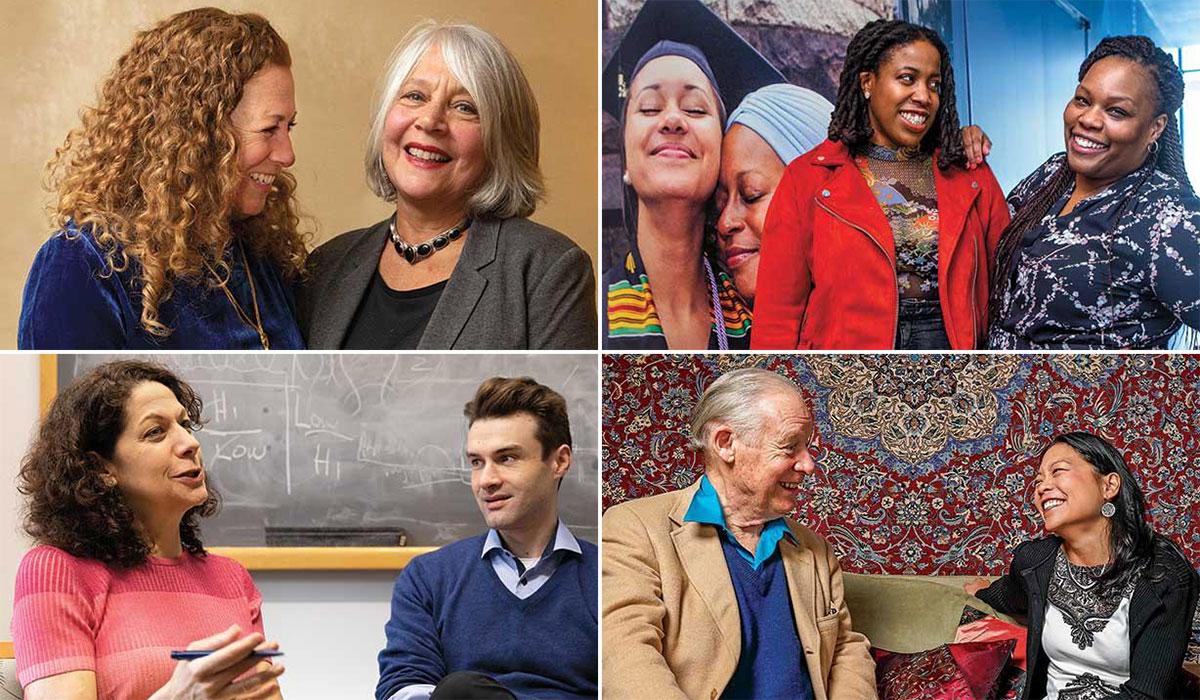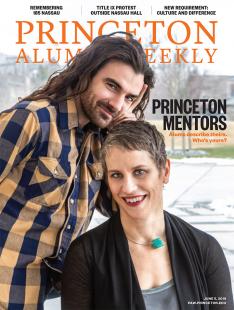Think back — just a year or two, perhaps, but maybe decades. There’s a good chance that someone associated with Princeton — a professor, staff member, or alum — took a special interest in you. Perhaps that person helped you steer through a rough patch or think through what you knew was a big idea, then kept encouraging you when others did not share your vision.
Princeton is a community of mentors. Through the Entrepreneurship Council, seasoned alumni mentors in New York City work with students and young alumni trying to create startups. Working with the Scholars Institute Fellows Program, which provides community and opportunities for first-generation, lower-income students, the Class of 1979 is inaugurating a mentoring program for these undergraduates. Departments and career offices across the campus connect students and alumni with other Princetonians who have valuable experience — not just in climbing the ladder, but in navigating challenges we encounter elsewhere in life.“The most fundamental type of teaching is a one-on-one relationship,” says William A. Massey ’77, a professor of operations research and financial engineering and an advocate for mentorship among minority scientists. “That’s something Princeton understands because of the senior thesis.”
“Mentorship is about creating a relationship where it’s fine to ask any question that you might not ask other people in power for fear of seeming ignorant,” says Dean of the College Jill Dolan. She says that while many students learn about mentorship in high school, others are new to the concept. “We try to introduce the idea of mentorship across populations and then find ways to enable students to really think about their advisers as mentors,” she says.
Who awakened your boldness? Tell us the story of you and your mentor. We’ll publish responses in print and at PAW Online.
Not all campus mentors are professors. Perhaps yours was the alum who convinced you that Princeton was the place where you’d begin creating your future, and then helped you find your way. Perhaps it was an empathetic staff member who understood the barriers you’d have to knock down. In her memoir, Becoming, Michelle Obama ’85 describes mentor Czerny Brasuell, the director of what was then the Third World Center and is now the Carl Fields Center: “She treated me like an adult, asking for my thoughts, listening keenly … she seemed determined to awaken more boldness in me.”
Allie Weiss ’13 is a writer and editor.
Mary Morris and Jodi Picoult ’87
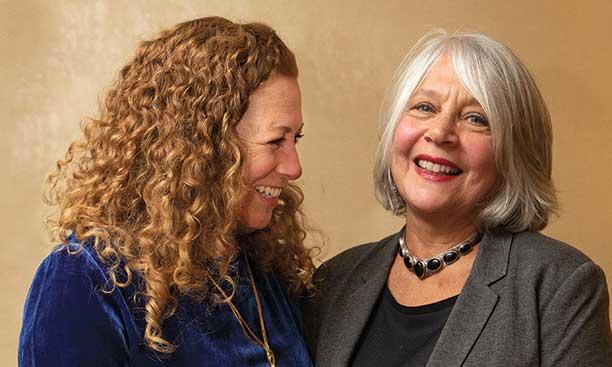
After one tense class, Jodi Picoult ’87 and former Princeton professor Mary Morris developed a close bond that persisted beyond Picoult’s college years. Picoult credits Morris with making her into the writer she is today — a global success with 25 novels to her name and an estimated 40 million books in print. The mentoring now goes both ways, with each author providing feedback on the other’s work.
Morris: I was a relatively young and new teacher. But I had a pretty strong sense of what I thought a student should be able to bring to the table. When I read Jodi’s work, I thought she was a really good writer but some things [in her work] could get moved around. I had a vision for her that I get sometimes with a student, and I thought that it would be a good lesson to workshop her story in class so we could cut and paste and move some scenes around.
I thought this was a great idea, but Jodi obviously didn’t. She came to me basically in tears and said, “No one’s ever touched my writing before.” I told her not to think of her work as engraved in marble. So Jodi went and did the work and she brought the story back. We made revisions a few times, and it was really better. I told her to send it to Seventeen, and they bought it. It was a big deal.
Picoult: The only reason I am a writer is because of what Mary taught me. I had been listening to her in class, and everything she said just made sense. But it wasn’t until I read her writing that I realized how fantastic she was. There’s a similarity in our language — Mary writes in a very clean way, and that’s what I responded to.
Creative writing programs, particularly at Ivy League universities, tend to turn out a certain kind of literary writer. Mary’s never looked down on me for writing commercial fiction. Not every creative writing professor feels there is value in that.
There was a moment when I realized that Mary was taking my work seriously, writer to writer, not just as teacher to student. That was a tremendous moment because there’s no one you respect more than the person who taught you everything you know.
Bonnie L. Bassler and Carey D. Nadell *11
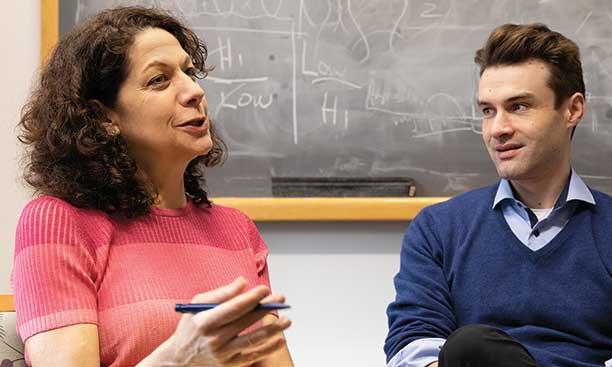
Though he started as a Ph.D. student in ecology and evolutionary biology, Carey Nadell *11’s line of research led him to the lab of Bonnie Bassler, a professor of molecular biology and the department chair. As a student and then a postdoc, Nadell worked with Bassler to develop a unique blend of disciplines that he has carried with him to Dartmouth, where he now runs a lab as assistant professor of biological sciences.
Bassler: Carey’s background was in evolutionary theory. He wanted to find a simple experimental system he could use to investigate the biological basis underlying the evolution of social behaviors.
I thought maybe he could teach us something and we could teach him something. We sent him to microbiology boot camp, and when he came back he was a player. Then he was just like everybody else — he was a member of the lab, but he had a different perspective. He exploited all of the techniques that we had been building for 20 years. But he was asking questions that I never would have asked.
There’s a reason we all don’t just work by ourselves. Everybody puts a little bit in, and the whole group succeeds more than they would have on their own. Everybody ended up broader, and the lab had a new dimension to it.
Nadell: My original Ph.D. adviser, Simon Levin, recognized that I should talk to Bonnie. That changed the trajectory of my life. Bonnie was very welcoming and generous — I didn’t know anything about microbiology or genetics. I just kind of hung around, like a stray cat, until I became an actual resident of the Bassler lab household.
It was exhilarating to be immersed in a real experimental group. When you’re doing theory, you’re working on a computer, and if you want to change the color of the bacteria in a simulation, that’s one line of code — it takes five seconds. But if you want to change the color of bacteria that you want to look at on a microscope, it might take three months. At first it was really hard. Bonnie was so patient with me.
You learn in Bonnie’s lab what wonderful leadership looks like. Being under Bonnie’s wing, you see how good leaders help people in their group feel good about what they’re doing and not just learn facts. I’m really grateful, especially now that I’m at Dartmouth and I have to do these things myself.
Tennille Haynes and Amina Yamusah ’13

As a student, Amina Yamusah ’13 spent much of her free time hanging out at the Carl A. Fields Center, but it wasn’t until Tennille Haynes started working there as director that Yamusah got more involved. She took a job working at the Fields Center full time after graduating, in a position that she believes helped lay the groundwork for the establishment of her own company, BLOC, an online professional resource for people of color.
Haynes: I met Amina when I started in 2012 at the Fields Center. Amina was a senior at the time. She was really like my student guide when I got here. She immediately made me feel welcome, and got me involved with students I otherwise wouldn’t have had a chance to meet.
When I started here, it was just me and a temporary administrative assistant. When that person left, I was trying to find somebody I could work with. And I said, “Amina, do you want to work at the Fields Center?” It worked really well, because Amina had a connection with a lot of the students here. We were able to develop that audience that much quicker because they knew her, they trusted her. If she’s connected to the Fields Center, then we were cool, too.
Yamusah: We were interested in bringing speakers to campus. Because of Tennille’s vision of getting institutional dollars and support behind these events, for the first time we were seeing events being packed.
Tennille gave me a lot of trust to get people out to events and to promote things. In hindsight, it really helped build my self-confidence. I left to join an entrepreneurship fellowship, and I don’t think without having Tennille’s support I would have had the confidence to go out and build my own organization afterward.
I build career-readiness software. Tennille helped me with the first conference, literally passing out conference bags. She was one of our first partners, actually bringing Princeton students to one of our events in New York, giving me advice on one of the first iterations of the platform. She was so pivotal in all of it.
Julian L. McPhillips ’68 and Terri A. Sewell ’86
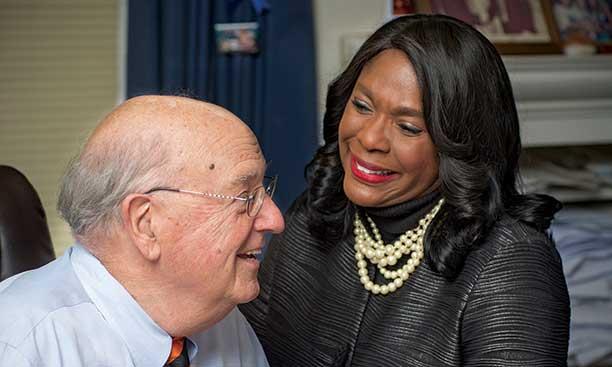
Terri Sewell ’86 says a phone call from attorney Julian McPhillips ’68 when she was in high school set her life on a different course. After McPhillips made a case for Princeton, she became the first person from her Selma, Ala., school to go to an Ivy League university. In 2011, she was sworn in as the U.S. representative for Alabama’s 7th Congressional District.
McPhillips: I started recruiting for Princeton because I had had such a great experience myself. In the early ’80s, I was reading the newspaper and I read about some young lady from Selma who had won a national debating championship. I said, well, she must be pretty bright, and I made contact with the family.
I met Terri at some kind of reception I had in my home. I could see what a bubbly, smart, eager person she was. I said in my letter of recommendation, this young woman could easily be a U.S. congressperson. It proved to be true.
We just hit it off. It’s hard not to hit it off with Terri. She fast became like a member of the family. So when the picture of her was taken as she was sworn into Congress in 2011, she had me and my wife, Leslie, right there beside her and Nancy Pelosi, with her mother and her aunt.
Sewell: I was minding my own business until my guidance counselor got a call from Julian’s secretary. The fact that this man would cut out a newspaper article and invite me to his house to hear about Princeton was really one of those moments in one’s life that changes it forever.
I had never really thought about Princeton. It was his infectious love of Princeton, the way Julian talked about how it changed his life. I don’t know if I would have reached the level of success that I did without the fervent belief that Julian had in my ability to do well at Princeton and to be someone.
My parents drove me up for orientation and helped me set up my room, and then only came back for graduation. It was Leslie and Julian who always came for the big football game and would take me and my roommates out for lunch. They were part of my foundation at Princeton. He and Leslie haven’t left me, even as an adult. About every formative decision I’ve had to make in my life, Julian’s been there.
Rebecca Lazier and Silas Riener ’06

Silas Riener ’06’s first foray into dance coincided with the beginning of Rebecca Lazier’s time teaching in Princeton’s dance program, and the overlap proved to be fruitful for both of them. A connection formed in the studio morphed into a lasting personal and professional one, as Riener danced for Lazier’s company after graduating and followed in her footsteps as a frequent teacher.
Lazier: It was my first semester at Princeton. I was creating a work, and Silas was in that piece. I was slowly discovering there’s something unique and special going on here.
The first time Silas would try something, it would be like he’s a colt — coordination was really lacking. But by the third time, it was somehow all together. It always amazed me — the capacity for transformation was so fast and so huge.
I do remember the day he called me after he graduated and said, “When are we going to start rehearsing?” We had seen a lot of shows together. But for me it was this moment of: Do I continue to grow with this person? Do I step away from being a teacher and be a peer? Both people have to be ready. There’s some kind of mentorship, but it’s really about evolving.
Riener: I remember Rebecca learned everyone’s name in the class in about five minutes. I had never seen anyone do that before, and I think it speaks to a command of teaching and a respect of the relationship of a teacher and a student.
I probably became what I hope was like a delightful nuisance to her. Her office had a window to the hallway, and I could see if she was in there. I would stop in all the time. I would kind of hang around, ask her questions, try to figure out what her life looked like as a choreographer and an artist and a teacher in this professional capacity. I don’t think I’d ever known a working artist before that.
She was a rare person in my life who would actually entertain and answer all my questions. If there’s a shape to the idea of mentorship, I think it’s about a continuing relationship that is based in inquiry for both of us. The conversation never runs out, and that has been true for the last 15 years.
John McPhee ’53 and Robert Wright ’79
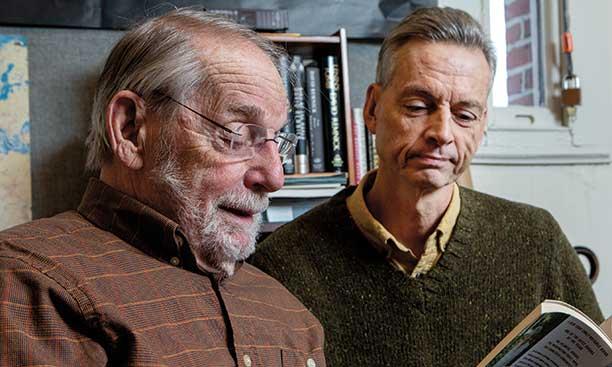
Writer and professor John McPhee ’53 estimates he’s taught some 500 students since he started leading a creative-nonfiction seminar in the 1970s. Journalist and author Robert Wright ’79 was a standout student. After stints in New York and Washington, D.C., Wright moved to Princeton, where his bond with McPhee has continued to flourish over the long bike rides they take together.
McPhee: I was teaching a nonfiction writing class that I still teach. Bob was outstanding. He was a good writer as a student. [But] he has evolved and become an ever more serious and significant writer.
Bob was a transfer student to Princeton from Texas Christian, and he gave me a strong belief in transfer students. Years later, when Princeton stopped taking transfer students, I was unhappy about that. Princeton ought to be really happy that he was here.
I kept up with him over all the years since. But then he came back to Princeton to live here. I’ve known him ever so well since because we go out on bicycles for exercise routinely. He is a very tightly scheduled writer. So you want to go out on your bicycle at 11? Certainly not; he can’t go until 11:15. I have to go out on a bicycle with him in order to talk to him [laughs]. He’s very much a part of the world I inhabit now.
Wright: I remember how privileged I felt to be in his class. The one-on-one conferences he does with students — those were very powerful because you felt you were getting feedback from a master. It was clear that he had read your work very carefully.
I remember being taken seriously by him — seriously enough that I thought maybe I should actually try being a writer. In one of those individual sessions, I remember him saying that he felt that a life of writing could be very rewarding. I took that as personal guidance. You’re in a malleable phase, and when you hear something like that from someone you revere, you take it as almost a message from God.
The relationship has so broadened that I will ask him about advice involving family matters and personal matters. He’s now a full-fledged, multidimensional kind of counselor. I consider him one of my best friends in the world.
Lynn T. White and Renee Hsia ’99
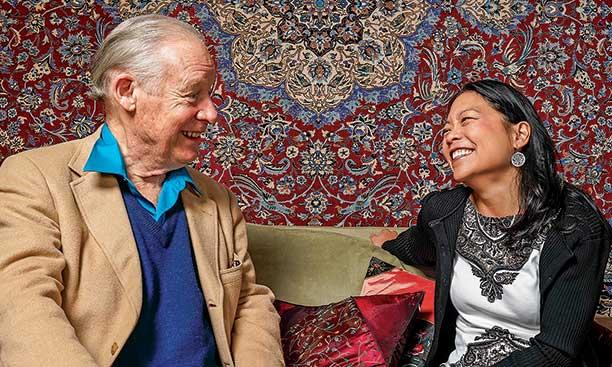
Before turning her attention to medicine, Pyne Prize winner Renee Hsia ’99, a physician and professor of emergency medicine and health policy, studied at the Woodrow Wilson School under Lynn White. She recalls how White, now emeritus, invited her to Thanksgiving dinner with his family one year when she was on campus, establishing what became a decades-long friendship. It’s also provided a model of a highly personable faculty-student relationship that she’s carried into her own teaching career.
White: Calling me a mentor and Renee a mentee isn’t entirely right. She was a mentor to me and to many other people. She volunteered a lot at Princeton — I remember she did work through the Student Volunteers Council.
How’d she do it? She had a very high grade-point average. She was taking hard courses. She was doing pre-med and a tremendous amount of volunteering. How she did all the things she did in the time she had — we’re each allotted 24 hours a day — is something that I don’t understand, and people were noticing that.
Her choice of [the emergency] medical field, especially for people who may not have insurance — it’s interesting. The emergency department is crucial for a lot of people. It doesn’t surprise me at all that that’s the particular field that she has gone in for.
Hsia: I did a junior task force with Lynn, and then I chose him as my senior-thesis adviser. He let me be very independent and gave me guidance. I traveled to a couple of places in rural China, kind of on my own. He was totally encouraging. I remember he sent me in his stead to present work at a conference in the U.K. That indicated I’m not going to embarrass him; he had faith in me.
We’ve stayed friends ever since. At my wedding, he gave me a spoon that was thought to have been used by Queen Victoria. He has a warmth that is not expected, I would think, of a university professor. It seemed very personal to me.
Even as a professor myself, there are so many students ... it’s hard. Lynn has these recollections — he remembers these things that I barely recall. These are things that are just really authentic.
John W. Rogers Jr. ’80 and Mellody Hobson ’91

Mellody Hobson ’91, a nationally known advocate for financial literacy, is quick to emphasize the larger-than-life presence John Rogers Jr. ’80 has had in her adulthood. She met him when she was in high school, and ever since she graduated from Princeton and went to work for his firm, Ariel Investments, where she’s been president since 2000, they’ve spoken every day. The two have developed a strong synergy that’s resulted in both a successful business and a deep well of mutual appreciation.
Rogers: I was part of a group that wanted to distinguish Princeton in its ability to draw prospective students. Mellody came to every event that I organized. She was so confident and mature for her age. You couldn’t help but notice her — she captivated the room whenever she was there.
She was really good at staying in touch, and that led to a summer internship. We worked very closely [together] because we didn’t have many interns. I immediately realized that she was a superstar. I spent a lot of time with her that summer, introducing her to my friends and peers and other alums, because she was a rare talent.
She read everything there was to read on investing and was obsessed about being an expert in the industry. She became invaluable right away. It only took a few years for her to become the head of our marketing department, and a few years after that, president of the firm.
Hobson: My first day of work, he took me to lunch and he said, “You’re going to work with people who have very good titles and make a lot of money, but it doesn’t mean their ideas are better than yours.” That was an invitation to contribute. That was probably the best gift he could ever give me.
I started to realize that if I could make myself indispensable to John, I could learn a lot. He would go to McDonald’s on Saturday mornings and read, and I would just show up there and sit with him. He gave me a lot of time — he would walk me through all sorts of things that I was learning.
It was a mentor-mentee [relationship] for many years, and then it evolved into a partnership. I think what works for us is there was always a tremendous amount of respect. When you’re not second-guessed or doubted, that makes for a better relationship. We know each other’s strengths. And we’re always pushing each other to be better.

